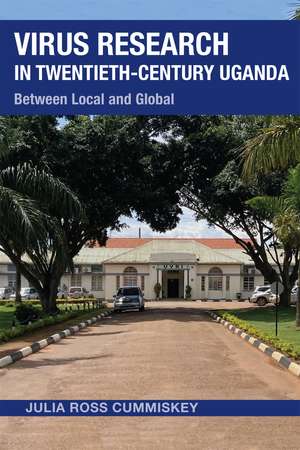Virus Research in Twentieth-Century Uganda: Between Local and Global: Perspectives on Global Health
Autor Julia Ross Cummiskeyen Limba Engleză Paperback – 10 dec 2024
Virus Research in Twentieth-Century Uganda presents the stories of scientists at the Uganda Virus Research Institute (UVRI), a biomedical center founded in 1936. The book analyzes the strategies and conditions that allowed the institute to endure and thrive through successive political and scientific regimes of the interwar period, the postwar period, the transition to independence, the conflicts of the 1970s and 1980s, and the Museveni presidency. Julia Ross Cummiskey combines methods and themes from the history of medicine and public health, science and technology studies, and African studies to show that the story of the UVRI and the people who worked there transforms our understanding of the nature of local and international expertise and the evolution of global health research over the course of the twentieth century.
Global health is one of the chief areas in which African and foreign institutions interact today. Billions of dollars are invested in global health projects on the continent, many involving strategically selected “local partners.” In the discourse of these projects, local and global are often framed as complementary but distinct categories of people, institutions, traditions, and practices. But the history of biomedical research at the UVRI shows that these distinctions are unstable and mutable and that people and institutions have mobilized both categories to attract funding, professional prestige, and research opportunities. The book complicates the local/global binary that is implicit (and sometimes explicit) in many studies of colonial, international, and global health and medical research, especially in Africa. Moreover, it challenges assumptions about global health as an enterprise dominated by researchers based in the Global North and recenters the history of biomedicine in Africa.
Global health is one of the chief areas in which African and foreign institutions interact today. Billions of dollars are invested in global health projects on the continent, many involving strategically selected “local partners.” In the discourse of these projects, local and global are often framed as complementary but distinct categories of people, institutions, traditions, and practices. But the history of biomedical research at the UVRI shows that these distinctions are unstable and mutable and that people and institutions have mobilized both categories to attract funding, professional prestige, and research opportunities. The book complicates the local/global binary that is implicit (and sometimes explicit) in many studies of colonial, international, and global health and medical research, especially in Africa. Moreover, it challenges assumptions about global health as an enterprise dominated by researchers based in the Global North and recenters the history of biomedicine in Africa.
Preț: 216.96 lei
Nou
Puncte Express: 325
Preț estimativ în valută:
41.52€ • 43.10$ • 34.62£
41.52€ • 43.10$ • 34.62£
Carte disponibilă
Livrare economică 01-15 martie
Livrare express 15-21 februarie pentru 31.92 lei
Preluare comenzi: 021 569.72.76
Specificații
ISBN-13: 9780821425695
ISBN-10: 0821425692
Pagini: 322
Ilustrații: 14 black-and-white illustrations
Dimensiuni: 152 x 229 x 20 mm
Greutate: 0.5 kg
Editura: Ohio University Press
Colecția Ohio University Press
Seria Perspectives on Global Health
ISBN-10: 0821425692
Pagini: 322
Ilustrații: 14 black-and-white illustrations
Dimensiuni: 152 x 229 x 20 mm
Greutate: 0.5 kg
Editura: Ohio University Press
Colecția Ohio University Press
Seria Perspectives on Global Health
Recenzii
"This important book makes three valuable contributions. It sheds new light on the history of major medical conditions: Yellow Fever, Burkitt’s lymphoma, and HIV/AIDS. In addition, the book traces a series of conceptual transitions within transnational clinical research. Most importantly, its institutional and biographical approach reveals the frameworks and relationships which enabled Ugandans to repeatedly enhance, and challenge, global scientific knowledge."—Shane Doyle, author of Before HIV: Sexuality, Fertility, and Mortality in East Africa, 1900–1980
Notă biografică
Julia Ross Cummiskey is an assistant professor in the Department of the History of Medicine at the Johns Hopkins University School of Medicine. Her research focuses on the history of global health research, policy, and practice in Africa.
Cuprins
List of Illustrations
Acknowledgments
Abbreviations
Introduction
PART I. YELLOW FEVER, 1936–1960
ONE Laboratory Life and Labor in Colonial Entebbe
TWO Tracking Viruses in the Field
PART II. BURKITT’S LYMPHOMA, 1961–1979
THREE Burkitt’s Lymphoma and the Invention of the Local Partner
FOUR Africanization and Negotiated Independence
FIVE The Burkitt’s Lymphoma Cohort Study in West Nile
PART III. HIV/AIDS, 1980–2000
SIX Ugandan Researchers and African AIDS
SEVEN When Local Results Contradict Global Consensus: The Trial of STD Treatment for HIV Prevention
Conclusion : Ebola, Zika, COVID-19, and Virus Research in Twenty-First-Century Uganda
Notes
Bibliography
Index
Acknowledgments
Abbreviations
Introduction
PART I. YELLOW FEVER, 1936–1960
ONE Laboratory Life and Labor in Colonial Entebbe
TWO Tracking Viruses in the Field
PART II. BURKITT’S LYMPHOMA, 1961–1979
THREE Burkitt’s Lymphoma and the Invention of the Local Partner
FOUR Africanization and Negotiated Independence
FIVE The Burkitt’s Lymphoma Cohort Study in West Nile
PART III. HIV/AIDS, 1980–2000
SIX Ugandan Researchers and African AIDS
SEVEN When Local Results Contradict Global Consensus: The Trial of STD Treatment for HIV Prevention
Conclusion : Ebola, Zika, COVID-19, and Virus Research in Twenty-First-Century Uganda
Notes
Bibliography
Index
Descriere
This case study contextualizes calls to decolonize global health within a long history of negotiations between scientists based in Uganda, the United States, and Europe over what research should be done, by whom, and where. The book covers colonial Uganda through the first years of Yoweri Museveni’s presidency.








